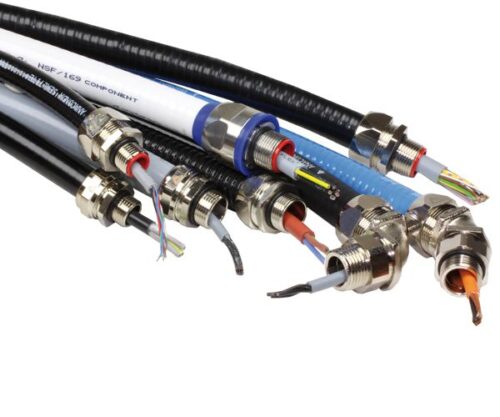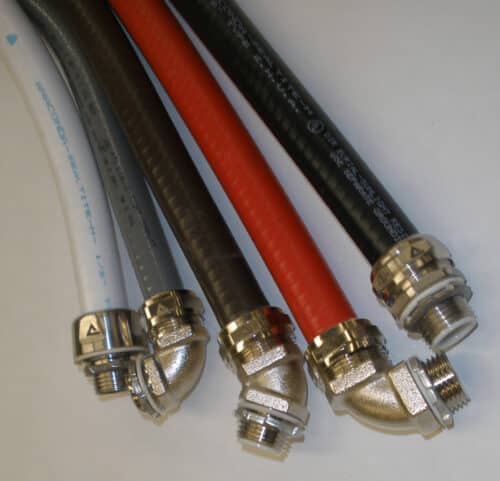What is a Conduit System? Understanding the Basics
Leave a CommentElectrical wires are often exposed to wear or weather where they are installed. The US National Electrical Code (NEC) lists protective options. Conduit systems have been developed to durably protect wiring in industrial and commercial applications. What is a conduit system, which kinds of electrical conduit are available, and what will help you choose an […]
What Flexible Conduit Is Allowed In Hazardous Locations?
Leave a CommentHazardous Locations are areas that expose flammable material to possible ignition. The National Fire Protection Association (NFPA) publishes NFPA 70, the (US) National Electrical Code (NEC) defining Hazardous Locations. Can flexible liquid tight conduit systems meet safety requirements for NEC Hazardous Locations? Yes, within the limit of Class I Division 2. Today, Class I Division […]
What Are Liquid Tight Fittings?
Leave a CommentWhat Are Liquid Tight Conduit Fittings? Electrical wires and cables require protection from dirt, oil and water on their curved paths to and from components or power supplies. Flexible wire and cable benefit from flexible protection. Liquid tight, flexible electrical conduit is commonly used to protect wiring where it must be installed. This conduit […]
What is Dual Listed Conduit?
Leave a CommentWhat is Dual Listed Conduit? Dual listed conduit and fittings meet Canadian Electrical Code and US National Electrical Code requirements for electrical safety and wiring protection. Since the early 1950s, manufacturers in Canada and the USA needed to sell electrical equipment into both national markets. The manufacturers tried to save money by specifying and buying […]
Where Do You Need Low Smoke and Halogen Free Conduit?
Leave a CommentDue to fumes and toxic gas resulting from fire, thermoplastic covers on flexible, electrical conduit must be low smoke and Halogen free. Movies and TV episodes often show firefighters kitted with breathing apparatus to prevent smoke inhalation, which can weaken and kill first responders. Past experience with electrical fires motivated the development and requirement for […]
Does Your Electrical Installation Need to Pass Safety Inspection?
Leave a CommentWhy install conduit that must be replaced if it does not pass safety inspection? Instead, choose and install UL listed conduit and fittings to make sure your wiring protection meets electrical safety code requirements. Make your safety inspector’s job easier by using products that show wiring is protected to national safety standards. The UL and […]
Why Use Low Smoke and Halogen Free Conduit?
Leave a CommentProtect People from Smoke Inhalation Avoid smoke inhalation. This can save your life. Most people do not have personal protection equipment in their homes that firefighters use to prevent smoke inhalation. So, regulations guiding construction and use of electrical equipment include prevention of smoke inhalation. Since November 6, 1896, the National Fire Protection Association (NFPA) […]

Various uses of fittings in different industries
Leave a CommentIn today’s demanding industrial conditions, conduit fittings can have a significant impact on efficiency, safety, costs and reliability. Anamet Electrical Inc. provides a diverse range of conduit fittings designed to meet unique industrial demands. From food and pharmaceuticals to hazardous locations, each sector requires special solutions. Let’s explore conduit fittings for industry, highlighting how SEALTITE® […]

How Do You Choose a Conduit Jacket?
Leave a CommentYou want a safe, liquid tight, flexible and durable electrical conduit? Meeting liquid tight, flexible and durable requirements for electrical conduit is just the start. There are options you may not have considered. These conduit jacket options are now available from ANAMET Electrical, Inc. High flexibilty Temperature resistance Chemical, oil, and corrosion resistance Anti-Static Food Grade […]
Tags: antistaticconduit, conduitjackets, foodgradeconduit, halogenfreeconduit, hosejackets, jacketcompounds, UVresistantconduit

How Deep Must Electrical Conduit Be Buried?
Leave a CommentHave you ever wondered how deep an electrical conduit needs to be buried? Or perhaps you’re undertaking a landscaping or construction project and need to know how deep to bury electrical conduit. For safe electrical installation, these are crucial questions. We will provide guidance on how deep electrical conduits must be buried, based on various […]
Tags: buryingwiring, conduitoptions, directburial, safeburial, undergroundwiring

